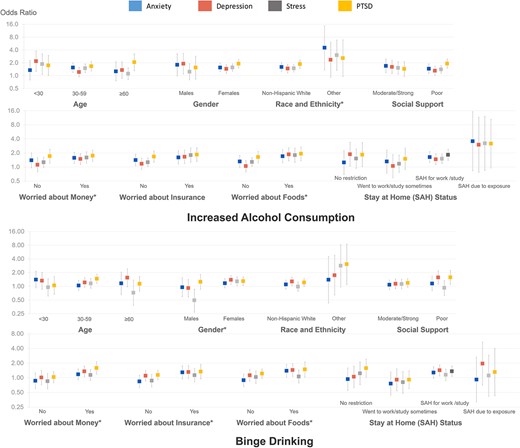2023-04-03 バッファロー大学(UB)
この研究によると、飲酒習慣を変えた人ほど精神的な問題を抱える割合が高く、一方、飲酒頻度が高い人はうつ病などの症状が少なかったという。特に、女性、経済的に不安定な人、マイノリティグループの人々は、コロナ禍中に飲酒量が増えたり、過剰に飲酒することで、より深刻なメンタルヘルスの問題に直面する可能性が高いことが示された。
<関連情報>
- https://www.buffalo.edu/news/releases/2023/04/001.html
- https://academic.oup.com/alcalc/advance-article/doi/10.1093/alcalc/agad011/7066352
COVID-19パンデミック時のアルコール摂取量とメンタルヘルス Alcohol Consumption and Mental Health during the COVID-19 Pandemic
Yihua Yue, Siyi Wang, Ella Smith, Divya Goyal, Kexin Zhu, Zuo-Feng Zhang, Beth Smith, Zhongzheng Niu, Lijian Lei, Jo L Freudenheim,Ying Cao, Lina Mu
Alcohol and Alcoholism Published:01 March 2023
DOI:https://doi.org/10.1093/alcalc/agad011

Abstract
Aims
To examine the association between alcohol consumption and mental health during the COVID-19 pandemic.
Methods
An anonymous online survey was distributed among US adults during May–August 2020 through social networks and ResearchMatch. We collected information on demographic, lifestyles and mental health symptoms including anxiety, depression, stress and post-traumatic stress disorder. Logistic regression models were used to examine the cross-sectional association between alcohol consumption and mental health symptoms. We also examined effect modification by race, age, gender, social support, financial insecurity and quarantine status.
Results
The analytical sample consists of 3623 adults. Stable drinking habits and regular drinking behaviors were found to co-exist with better mental health status. Participants who increased their alcohol use had higher odds of developing mental health disorders than those who maintained their pre-pandemic drinking habits. Additionally, participants who engaged in binge drinking during the pandemic had higher odds of depression and stress than those who did not. The associations regarding increased drinking and binge drinking in relation to adverse mental health outcomes were stronger among females, racial minorities, and individuals with financial concerns, poor social support and restricted quarantine status than their counterparts.
Conclusions
During the early stage of the COVID-19 pandemic, increased alcohol use and binge drinking are cross-sectionally associated with higher odds of mental health disorders, which highlighted the need for targeted intervention to address the mental health needs of individuals who have engaged in these behaviors, especially among females, minorities, those with insecurities or with restricted quarantine status.

